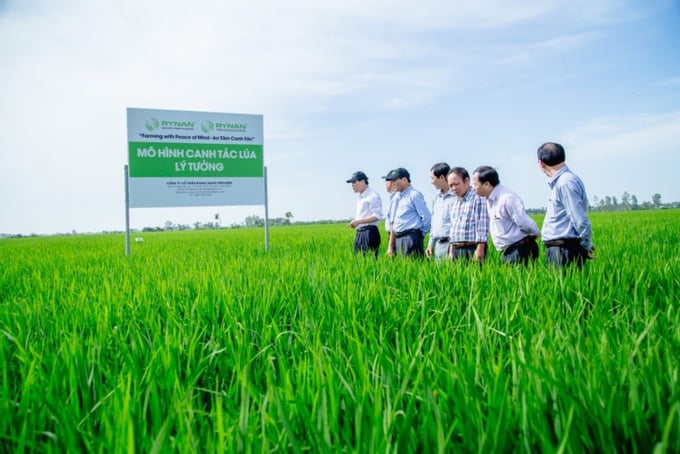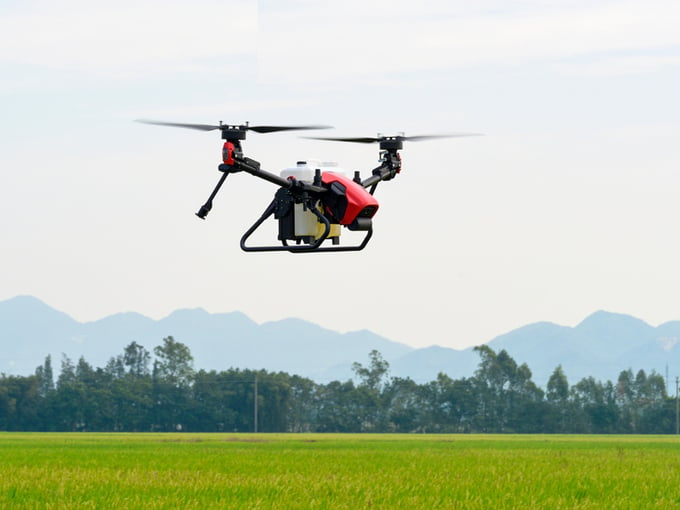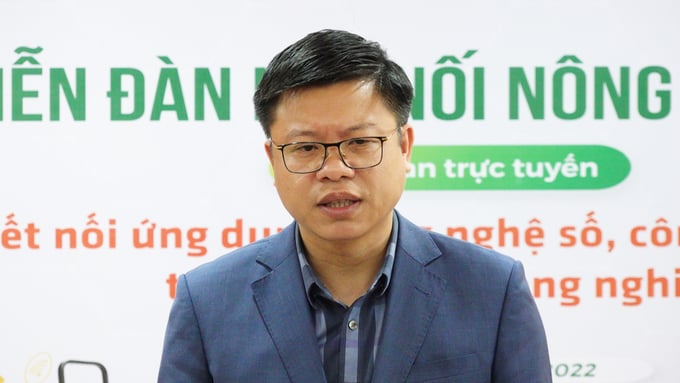October 24, 2025 | 06:12 GMT +7
October 24, 2025 | 06:12 GMT +7
Hotline: 0913.378.918
October 24, 2025 | 06:12 GMT +7
Hotline: 0913.378.918

IoT application in agricultural farming in Dong Thap. Photo: T.L.
Digital transformation in agriculture is applying digital technologies from production to processing, distribution and consumption of products.
Digital transformation in agriculture includes basic activities such as applying modern technology in farming, linking value chains and changing management methods.
In addition to the application of modern technology, digital transformation in agriculture must also link the components of the agricultural ecosystem naturally along the value chain. The technology solution development center must be located in a central position. Other components interact with each other, promoting the technology solution development center to develop and enjoy the benefits that the center offers.
The digital transformation project in agriculture and digital technology application in Vietnam being implemented by the Ministry of Agriculture and Rural Development has set out the goals, roadmap, and direction of the country's agriculture to become a real economy.
In which, ensuring components such as knowledge, technology, labor force, means of labor, and market, ... are closely linked by a transparent, equal "linking chain" to create agricultural products with high commercial value through digital technology.

Dong Thap province has applied digitization technology in 3 stages. Photo: T.L.
Dong Thap is one of the localities with a detailed plan in stages to implement the digital transformation project in agriculture and the application of digital technology. Mr. Le Quoc Dien, Deputy Director of the Department of Agriculture and Rural Development of Dong Thap province, said that the locality had applied digital technology in 3 stages. In phase 1, this province focused on building a database for agricultural production activities, especially in traceability and planting area codes.
Dong Thap has built up general information and fields of rural and new rural development, OCOP products in the cultivation field. The locality has made the data about the product so that people can update and track it.
In the field of animal husbandry and fisheries, the province has built a database; In the fields of irrigation and natural disaster prevention, measures have been taken to warn, prevent and control natural disasters and be proactive in production.
According to Mr. Le Quoc Dien, in phase 2, Dong Thap will build databases to control and forecast the productivity and output of crops and livestock and respond to climate change. The locality has built data on plant pests and water quality indicators for the IoT solution. It helps the districts manage production efficiently.
In phase 3, Dong Thap will develop a combination of GIS technology with AI artificial intelligence, forecast output, market, and trade promotion. Synchronize data from central to local to unify with a national digital agriculture platform.
According to Mr. Dien, the locality can manage the planting area code and understand the digital data in the cultivation and plant protection field. Finally, deploy and train to update digital data for communes through smartphone applications.

Mr. Nguyen Quoc Toan, Director of Agricultural Product Processing and Market Development (MARD). Photo: Quang Linh.
Currently, Dong Thap province has 265 OCOP products, and to be able to look up these products, the province has built a database with precise descriptions and classifications for people and management levels to understand clearly. The current problem in the locality is that it is difficult to access technology and the digital transformation is still slow. Therefore, the locality wishes to have more training courses with enterprises, cooperatives and farmers.
Sharing at the Forum on the connection of digital and high-tech applications in agricultural production organized by the Executive Group of the 970 Agricultural Product Connection Forum, Mr. Nguyen Quoc Toan, Director of the Department of Processing and Market Development According to the Ministry of Agriculture and Rural Development, the country currently has about 5,000 craft villages, of which there are nearly 2,000 agricultural craft villages.
“If we build a database of craft villages, we can spread cultural values with technology. Tourists come to us through cyberspace, bringing the image of Vietnam to the world," said Mr. Toan.
The Department of Agricultural Product Processing and Market Development director said that each place has an understanding and way of doing it with the same planting area and animal feed code. Therefore, the Vietnam Digital Agriculture Association needs to connect more with the local Departments of Agriculture and Rural Development, creating solid support for farmers.
According to the National Center for Agricultural Extension, two items firmly applied for digital transformation are rice and coffee, followed by the aquaculture industry.
Provincial Agricultural Extension Centers strongly support farmers in online sales and online training. Each year, the agricultural extension agency organizes about 240 online training classes, enabling many people to access the materials simultaneously.
Translated by Ha Phuc

(VAN) It is necessary to establish a straw purchasing market for farmers instead of passively controlling, thereby taking proactive measures to protect air quality.

(VAN) The ALiSEA Alliance continues to support initiatives proving farmers can be central innovators in the agroecological transition.

(VAN) Dr. Cao Duc Phat emphasizes that successful transition requires integrated irrigation, resource mobilization, and placing farmers and businesses at the center.

(VAN) The 2025 'For a Green Viet Nam' program helps educate, promote environmental protection, and encourage sustainable lifestyles within the community.

(VAN) General Secretary To Lam witnessed an MoU on environment, biodiversity, and climate change signed between Viet Nam’s MAE and Finland’s Ministry of the Environment.

(VAN) Thorough risk analysis and research on water security solutions will help address challenges in the context of climate change.

(VAN) Deputy Minister Tran Thanh Nam outlined proposals to effectively implement the “Medium- and long-term vision for Viet Nam - Japan agricultural cooperation, phase III.”